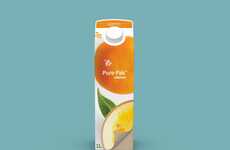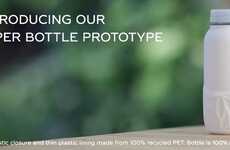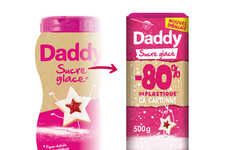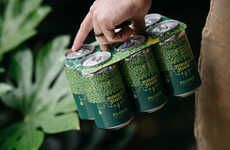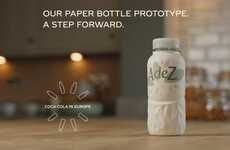
The Cardboard Can is a Cheaper and Greener Aluminum Alternative
Michael Hines — January 25, 2012 — Eco
References: betonwerkkeienburg.de & springwise
German company Keienburg GmbH has developed a cardboard can for carbonated drinks designed to save manufacturers money and make the world a greener place. The cardboard can is made almost entirely out of paper with only the lid being made of aluminum.
This new design cuts costs by letting manufacturers make a ton of cans out of a small reel of cardboard. A reel of cardboard measuring 4 x 0.5 feet can create a staggering 4,000 cans. Keinenburg GmbH estimates that companies can save up to 30 percent in production costs by using these cardboard cans. Consumers will benefit too in that their drinks will stay colder for longer. The Earth will also benefit from a cardboard can in that there won’t be as many aluminum cans winding up in landfills.
This new design cuts costs by letting manufacturers make a ton of cans out of a small reel of cardboard. A reel of cardboard measuring 4 x 0.5 feet can create a staggering 4,000 cans. Keinenburg GmbH estimates that companies can save up to 30 percent in production costs by using these cardboard cans. Consumers will benefit too in that their drinks will stay colder for longer. The Earth will also benefit from a cardboard can in that there won’t be as many aluminum cans winding up in landfills.
Trend Themes
1. Cardboard Can - Opportunity for disruptive innovation in the packaging industry by replacing traditional aluminum cans with more eco-friendly cardboard counterparts.
2. Cost Cutting - Opportunity for disruptive innovation in manufacturing processes by implementing cost-effective solutions such as using reels of cardboard to create large quantities of cans.
3. Sustainability - Opportunity for disruptive innovation in the beverage industry by adopting more environmentally friendly packaging options like the cardboard can.
Industry Implications
1. Packaging - Innovative packaging solutions like the cardboard can have the potential to disrupt the traditional aluminum can market and offer more sustainable alternatives.
2. Manufacturing - Implementing cost-cutting measures through the use of cost-effective materials like cardboard can have a disruptive impact on the manufacturing industry.
3. Beverage - The adoption of eco-friendly packaging options like the cardboard can presents opportunities for disruptive innovation in the beverage industry and appeals to consumers seeking more sustainable choices.
1.5
Score
Popularity
Activity
Freshness


